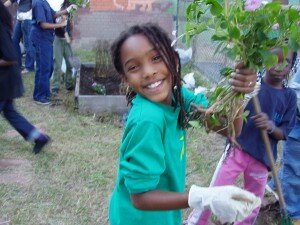 Are you looking for creative ways to engage volunteers, respond to community needs, and raise money for a good cause? Consider a serve-a-thon!
Are you looking for creative ways to engage volunteers, respond to community needs, and raise money for a good cause? Consider a serve-a-thon!
Similar to walk-a-thons, serve-a-thons use a team-based approach to raise money for a designated cause. Participants secure sponsors who pledge to support their service, usually based on the number of hours served.
Here are a few steps to guide you in planning an environmentally based serve-a-thon.
Develop a plan. Form a committee you help manage the neighborhood cleanup project. State a specific purpose (i.e., clean up the local park, raise money for a specific cause/organization). Create a timeline and plan for implementing your ideas, and get the word out.
Build your teams. Team leaders recruit 6-12 friends, family members, coworkers, or others for their teams. They can even create team names to be included on the event t-shirt. Each member will be responsible for a minimum donation.
Set a location. Identify an area to clean up – a road, a series of roads, a park, a school, etc. Check the area for appropriateness before assigning teams to serve in that area. Ask your local government for recommendations of roads/areas that need to be cleaned. Don’t be afraid to ask if they will pick up the trash and recyclables you collect!
Secure resources. Buy or get in-kind donations of needed supplies, including trash bags, gloves, and hand sanitizer.
Keep your fundraising goal in mind. Make sure all teams are well informed, empowered, and equipped to fundraise. You want them to feel comfortable asking for pledges. Remind team members that they are giving people an opportunity to support a specific cause while beautifying the community, You can also take advantage of online fundraising tools such as Crowdrise or First Giving.
Review last minute details and communicate with volunteers. Ensure volunteers have project details, such as time and location, and that materials are ready. Educate volunteers about acceptable recyclable items (click here for a project playbook that includes an environmental service learning activity for youth!), and encourage them to be aware of safety at all times.
Collect donations and trash! Have teams collect all donations so they can be compiled and given to the cause or organization of choice. Lead your team in a safe and fun environmental project. Remember to separate trash from recyclables!
Recognize volunteers and celebrate. Thank volunteers for their work and for the donations collected. You may want to recognize the top fundraisers and/or the team that collects the most trash/recyclables.
Reflect and learn. As with any service project, take time to reflect on the experience, the impact of the project on the community, and what you learned about yourself, the issue, or the community.

 In America today, people of many different faiths and beliefs live side by side. In addition, the vast majority of organizations people give their time and service to are faith-based. The opportunity lies before us to work together to build a society rooted in the values we treasure. Such a society can only be built on a sure foundation of mutual respect, openness and trust. This means finding ways to live our lives of faith with integrity and allowing others to do so, as well. This tip sheet is intended to underscore concepts that are fundamental to the process of stepping out of our proverbial comfort zones and interacting with others from different religious and cultural backgrounds in volunteering and service environments and beyond.
In America today, people of many different faiths and beliefs live side by side. In addition, the vast majority of organizations people give their time and service to are faith-based. The opportunity lies before us to work together to build a society rooted in the values we treasure. Such a society can only be built on a sure foundation of mutual respect, openness and trust. This means finding ways to live our lives of faith with integrity and allowing others to do so, as well. This tip sheet is intended to underscore concepts that are fundamental to the process of stepping out of our proverbial comfort zones and interacting with others from different religious and cultural backgrounds in volunteering and service environments and beyond. outdoors doing community service while bonding with your friends & family. You and your dad ca plant seeds, turn compost, and dig in the dirt. Remember to bring all your banana peels, apple cores, any rotting lettuce you forgot was in the refrigerator, tops of carrots or peppers that you cut from your dinner preparations, and coffee grounds from your breakfast to also help feed the compost system.
outdoors doing community service while bonding with your friends & family. You and your dad ca plant seeds, turn compost, and dig in the dirt. Remember to bring all your banana peels, apple cores, any rotting lettuce you forgot was in the refrigerator, tops of carrots or peppers that you cut from your dinner preparations, and coffee grounds from your breakfast to also help feed the compost system. Celebrate all the fathers in your community by delivering donuts! That’s right, donuts are the ultimate comfort food and a pleasant way to say thank you to all the dads in your neighborhood. I’m pretty sure they’ll love this simple treat this father’s day.
Celebrate all the fathers in your community by delivering donuts! That’s right, donuts are the ultimate comfort food and a pleasant way to say thank you to all the dads in your neighborhood. I’m pretty sure they’ll love this simple treat this father’s day. Are you a recent graduate looking for a new job? Maybe you are someone who is looking a for a new career path to develop some skills? Volunteering is the best outlet possible to do all of these things!
Are you a recent graduate looking for a new job? Maybe you are someone who is looking a for a new career path to develop some skills? Volunteering is the best outlet possible to do all of these things! organization’s board or advisory council, participate in a focus group, or help write a group’s vision.
organization’s board or advisory council, participate in a focus group, or help write a group’s vision.
 nteers is an unrealistic goal.
nteers is an unrealistic goal. are able to serve again. Keep in touch with them to let them know that you care about their well-being.
are able to serve again. Keep in touch with them to let them know that you care about their well-being.
 mean more because they are not paid to give it.
mean more because they are not paid to give it.
 It is important to provide inclusive projects for both your volunteers and your staff members to guarantee retention. When volunteers feel their work is both meaningful and fulfilling, they are more likely to return.
It is important to provide inclusive projects for both your volunteers and your staff members to guarantee retention. When volunteers feel their work is both meaningful and fulfilling, they are more likely to return. June is not only the month for summer fun; it is also a month to get prepared! June is National Safety Month. The summer hosts a number of fun activities for warm weather, but it is also important that you are safe about these activities. From the pool to the lake it is important to not only have fun, but also to be safe.
June is not only the month for summer fun; it is also a month to get prepared! June is National Safety Month. The summer hosts a number of fun activities for warm weather, but it is also important that you are safe about these activities. From the pool to the lake it is important to not only have fun, but also to be safe. prevent house damage.
prevent house damage.
 Summer time is such a great time of year. By following these tips, you will ensure a care-free season for your entire family!
Summer time is such a great time of year. By following these tips, you will ensure a care-free season for your entire family!
 June 5 is the United Nations Environment Programme’s World Environment Day. World Environment Day is an annual event aimed at being the biggest and most widely celebrated day of environmental impact across the world. The United Nations mission is to empower individuals to become global agents of change for environmental issues through global action.
June 5 is the United Nations Environment Programme’s World Environment Day. World Environment Day is an annual event aimed at being the biggest and most widely celebrated day of environmental impact across the world. The United Nations mission is to empower individuals to become global agents of change for environmental issues through global action.

 g act today, choosing a greener lifestyle will not only benefit your community, but also your wallet. Choose today to be the first day of the rest of your green life.
g act today, choosing a greener lifestyle will not only benefit your community, but also your wallet. Choose today to be the first day of the rest of your green life. Whether you’re looking for Garbage’s latest album, Endless Summer from the Beach Boys, or one of thousands of other albums available on
Whether you’re looking for Garbage’s latest album, Endless Summer from the Beach Boys, or one of thousands of other albums available on 

